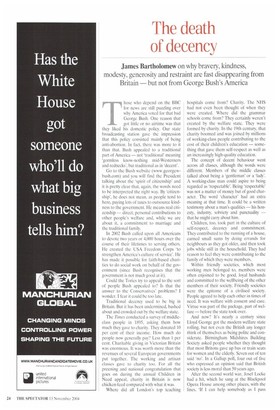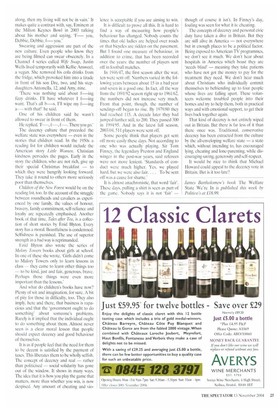The death of decency
James Bartholomew on why bravery, kindness, modesty, generosity and restraint are fast disappearing from Britain — but not from George Bush's America Those who depend on the BBC for news are still puzzling over why America voted for that had George Bush. One reason that got little or no airtime was that they liked his domestic policy. Our state broadcasting station gave the impression that this policy consisted mainly of being anti-abortion. In fact, there was more to it than that. Bush appealed to a traditional part of America — not 'traditional' meaning 'gormless know-nothing mid-Westerners and rednecks', but traditional as in `decent'.
Go to the Bush website (www.georgewbush.com) and you will find the President talking about the `spirit of citizenship' and it is pretty clear that, again, the words need to be interpreted the right way. By 'citizenship', he does not mean, as people tend to here, paying lots of taxes to outsource kindness to the government. He means real citizenship — direct, personal contributions to other people's welfare and, while we are about it, a commitment to marriage and the traditional family.
In 2002 Bush called upon all Americans to devote two years or 4,000 hours over the course of their lifetimes to serving others. He created the USA Freedom Corps `to strengthen America's culture of service'. He has made it possible for faith-based charities to do social work on behalf of the government (since Bush recognises that the government is not much good at it).
Could the Tories try to appeal to the sort of people Bush appealed to? Is that the answer to the Conservatives' problems? I wonder. I fear it could he too late.
Traditional decency used to be big in Britain. But it has been undermined, bashed about and crowded out by the welfare state.
The Times conducted a survey of middleclass people in 1895, asking them how much they gave to charity. They donated 10 per cent of their income. How much do people now generally pay? Less than 1 per cent. Charitable giving in Victorian Britain was enormous. It was worth more than the revenues of several European governments put together. The working and artisan classes gave to charity too. For all the preening and national congratulation that goes on during the annual Children in Need appeal, charity in Britain is now chicken-feed compared with what it was.
Where did all London's top teaching hospitals come from? Charity. The NHS had not even been thought of when they were created. Where did the grammar schools come from? They certainly weren't created by the welfare state. They were formed by charity. In the 19th century, that charity boomed and was joined by millions of working-class people contributing to the cost of their children's education — something that gave them self-respect as well as an increasingly high-quality education.
The concept of decent behaviour went across all classes, although the words were different. Members of the middle classes talked about being a `gentleman' or a 'lady'. A working-class man could aspire to being regarded as 'respectable'. Being 'respectable' was not a matter of money but of good character. The word 'character' had an extra meaning at that time. It could be a written testimony about a man's qualities — his hon esty, industry, sobriety and punctuality that he might carry about him.
Children, too, took part in the culture of self-respect, decency and commitment. They contributed to the running of a house, earned small sums by doing errands for neighbours as they got older, and then took jobs while still in the household. They had reason to feel they were contributing to the family of which they were members.
Within friendly societies, which most working men belonged to, members were often enjoined to be good, loyal husbands and committed to the wellbeing of the other members of their society. Friendly societies were the epitome of a civilised society. People agreed to help each other in times of need. It was welfare with consent and care. Virtue was part of the package, part of welfare — before the state took over.
And now? It's nearly a century since Lloyd George got the modern welfare state rolling, but not even the British any longer think of themselves as being polite and considerate. Birmingham Midshires Building Society asked people whether they thought that most Britons gave up bus or train seats for women and the elderly. Seven out of ten said 'no'. In a Gallup poll, four out of five who expressed an opinion said that British society is less moral than 50 years ago.
After the second world war, Josef Locke had a hit, which he sang at the Blackpool Opera House among other places, with the lines, 'If I can help somebody as I pass
along, then my living will not be in vain.' It makes quite a contrast with, say, Eminern at the Milton Keynes Bowl in 2003 talking about his mother and saying, 'F— you, Debbie, Debbie, f— you.'
Swearing and aggression are part of the new culture. Even people who know they are being filmed can swear obscenely. In a Channel 4 series called Wife Swap, Justin Wells lived temporarily with Kel lie Answeel, a vegan. She removed his cola drinks from the fridge, which provoked him into a tirade in front of his son Dre, two, and his stepdaughters Antonella, 12, and Amy, nine.
'There was nothing said about f—ing fizzy drinks. I'll have whatever I f—ing want. That's all b—s. I'll wipe my f—ing a with that!' he said.
One of his children said he wasn't allowed to swear in front of them.
He replied, 'F , 1--. There you go.'
The decency culture that preceded the welfare state was everywhere — even in the stories that children read, In the 1950s a reading list for children would include the American story Little Women. Christian kindness pervades the pages. Early in the story the children, who are not rich, give up their special Christmas breakfast — to which they were hungrily looking forward. They take it round to others more seriously poor than themselves.
Children of the New Forest would be on the reading list, too. In the account of the struggle between roundheads and cavaliers as experienced by one family, the values of honour, bravery, family commitment, self-reliance and loyalty are repeatedly emphasised. Another book of that time, Tales after Tea, is a collection of short stories by Enid Blyton. Every story has a moral. Boastfulness is condemned. Selfishness is punished. The use of superior strength in a bad way is reprimanded.
Enid Blyton also wrote the series of Malory Towers books about girls at school. In one of these she wrote, 'Girls didn't come to Mabry Towers only to learn lessons in class — they came to learn other things too — to be kind, just and fair, generous, brave. Perhaps those things were even more important than the lessons.'
And what do children's books have now? Plenty of wit and imagination, for sure. A bit of pity for those in difficulty, too. They also imply, here and there, that business is rapacious and that the 'government ought to do something' about someone's problems. Rarely is it implied that the individual ought to do something about them. Almost never seen is a clear moral lesson that people should expect decency and good behaviour of themselves.
It is as if people feel that the need for them to be decent is satisfied by the payment of taxes. This liberates them to be wholly selfish. The concept of decency and real — rather than politicised — social solidarity has gone out of the window. It shows in many ways. The idea that it is how you play the game that matters, more than whether you will, is now despised. Any amount of cheating and vio
fence is acceptable if you are aiming to win.
It is difficult to prove all this. It is hard to find a way of measuring how people's behaviour has changed. Nobody counts the times that old ladies are helped over roads or that bicycles are ridden on the pavement. But I found one measure of behaviour, in addition to crime, that has been recorded over the years: the number of players sent off in football matches.
In 1946/47, the first season after the war, ten were sent off. Numbers varied in the following years between about 15 in a bad year and seven in a good one. In fact, all the way from the 1891/92 season right up to 1961/62, the numbers did not increase very much. From that point, though, the number of sendings-off began to rise. By 1979/80 they had reached 115. A decade later they had jumped further still, to 200, They passed 300 in 1994/95. And in the latest full season, 2003/04. 511 players were sent off.
Some people think that players get sent off more easily these days. Not according to one who was actually playing. Sir Tom Finney, the legendary Preston and England winger in the post-war years, said referees were not more lenient. 'Standards of conduct were much higher. Yes, we played hard, hat we were also fair. . . To be sent off was a cause for shame.'
It is almost anachronistic, that word 'fair'. These days, pulling a shirt is seen as part of the game. Nobody says it is not 'fair' — though of course it isn't. In Finney's day, fouling was seen for what it is: cheating.
The concepts of decency and personal civic duty have taken a dive in Britain. But they are still alive in America — not everywhere but in enough places to be a political factor. Being exposed to American TV programmes, we don't see it much. We don't hear about hospitals in America which boast they are 'needs blind' — meaning they take patients who have not got the money to pay for the treatment they need. We don't hear much about Christians who individually commit themselves to befriending up to four people whose lives are falling apart. These volunteers welcome troubled people into their homes and try to help them, both in practical ways and with emotional support, to get their lives hack together again.
That kind of decency is not entirely wiped out in Britain. But there is far less of it than there once was. Traditional, conservative decency has been extracted from the culture by the all-enveloping welfare state — a state which, without intending to, has encouraged lying, cheating and lone-parenting, while discouraging saving, generosity and self-respect.
It would he nice to think that Michael Howard could appeal to the decency vote in Britain. But is it too late?
James Bartholomew's book The Welfare State We're In is published this week by Politico's at £18.99.



























































































 Previous page
Previous page